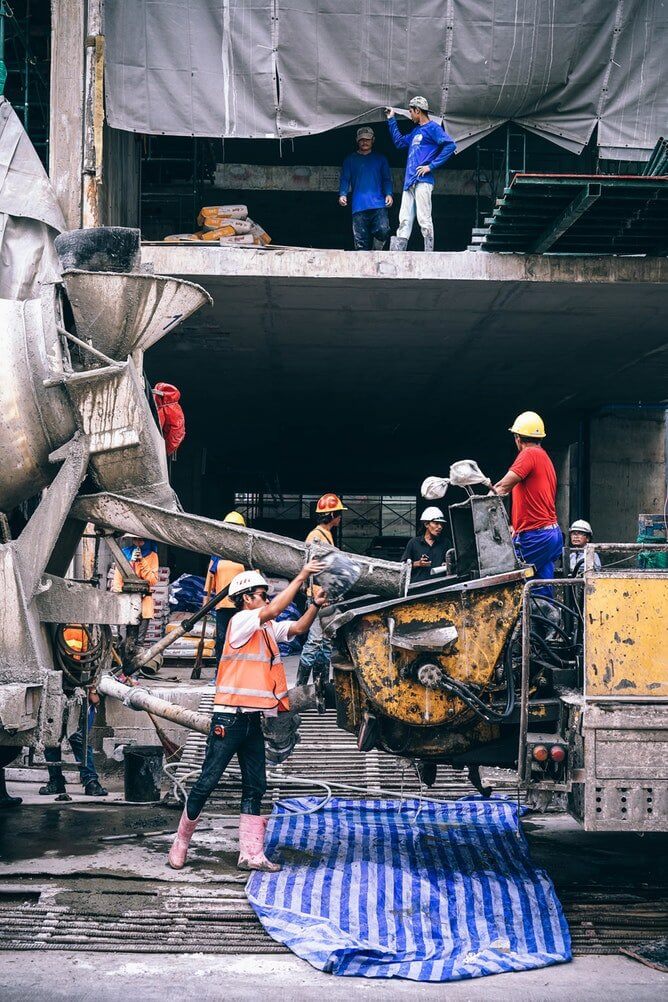BY JANET SOUTH

We can thank Mike Rowe for giving a face to many specialized trades that were historically unknown to the public. With this new Hollywood recognition of how cool specialized construction trades are, the world is meeting the artists behind the leather work gloves and the tech industry experts that help guide the design, coating and fabrication world. Trade Experts are in high demand, and here’s the thing: hundreds of industry specific trade positions are open that many job seekers do not even know exist.
Traditionally, the general public associates the term “construction” with strong men walking around a building construction site wearing hard hats. But the construction industry has become so diversified and niche specific in today’s world. We have a great need for talented design-focused metal workers and marine coating specialists; there is a sea of opportunities for people who want a career that offers upward mobility and free training within a good company.
“Over the next 10 to 15 years, the weak growth rate of labor productivity and the retirement of baby boomers are expected to further exacerbate the issue. A recent study by Conference Board analyzing 457 occupations ranked construction workers ninth in its labor shortages index, and found that the occupation faces a higher risk of labor shortage than 91.4% of all other examined.”
What about the money, you ask. Good question. The general pay checks for the specialty construction industry are quite impressive. Here’s an interesting little-known fact: the pay scale in these specific trades is often higher than many college degree jobs pay.

“Trades are suffering. We need to get more youth involved in trade schools to actually do the work for plumbing, electrical, roads, bridges, infrastructure, HVAC…etc. We need some redirection of ideas for school counselors to guide students into trades.”
-Janet South

What happened to make this need for people to fill jobs in the construction industry? An in-depth CBS article acutely pointed out…
“The 2008 recession hit on homeowners, and homebuilders, hard. More than 1.5 million residential construction workers left the industry. Some changed careers; others simply retired. Many immigrant workers went home and never came back because of tougher immigration laws.”
So, as you can see, there is a great, and ever-growing need to create experts in the specialty trades industry. Instead of writing you a long drawn out explanation of why becoming a trade expert is such a great career track to choose, I’ll give you the highlights:
· The opportunity for advancement is great. Niche markets require specific experience that is often hard to come by.
· Industry specific trades can start after high school graduation or with a 2-year vocational degree. You don’t need a college degree.
· Internships are plentiful, supported by industry specific trade organization groups. There are many ways that the construction industry is reaching out, and one of the biggest ways they are doing that is by bringing in people who are ready and willing to learn.

· There is no college debt. By the time a counterpart college student attends a 4-year program, considerable debt often has been incurred. The 4-year plan is commonly extended to a 5-year. In comparison, the trade path student is utilizing classroom time and hands on experience straight out of the gate of high school. Another thing: their employer pays for the training. Over a period of 4 years, the trade bound individual is well on the way to becoming a subject matter expert while creating a pathway to wealth derived from income.
· Leadership opportunities and promotions for the trades are numerous and paid training continues to grow. Experience gained in the 4-year period leverages the individual in the job market as a desirable candidate with negotiation power to leverage job opportunities. Interestingly, in today’s market, college students seem to be working harder than ever to seek out internship opportunities for the experience future employers are seeking.
Facts of interest…
Waste water treatment is a cool job I know this category may be at first, considered dirty and gross. However, WWT plants are operated with high standards, strict operations, and creative solutions. Sophisticated equipment, visual inspections, and maintenance is critical to proper operation.
What’s interesting about this trade… Certifications for WWT are not offered in college or trade school settings. Trade specific certifications are gained from WWT education platforms which are often paid for by the owner/employer. This means that many times, you are actually getting paid to become a subject matter expert on the job.

Opportunities for fast track advancement have never been greater Corporate America has sorely neglected training the next wave of subject matter experts to replace the retiring workforce. The next generation has different values than baby boomers.
Why Millennials are a great match for trades… Millennials want a balance in lifestyle, valuing time off for experiences, relaxation, community activities, and personal growth. Perhaps baby boomers thought the next generation had to “pay their dues” without allowing that payment to finally “mature” and turn over the reins. The mid-level population is missing to fill those positions.
College debt and costs are the next bubble to burst Skilled trade jobs have been increasingly abandoned as parents and educators push for youth to get college degrees. College degrees are great, depending on what your career goals may be. However, college is not for everyone, nor is a degree the best choice for every person. We need to begin pushing careers in the trades. According to a CBS news article, “Seventy percent of graduating high school seniors head off to a two- or four-year college where, in addition to their studies, many learn how to build debt. On average, college grads leave school with $37,000 in student loans.”
Creating a sustainable workforce and future A major question I pose: Who is going to fix and maintain electrical and structural systems in homes and businesses? Who is going to keep electrical circuits and grids live, or Waste Water Treatment in working order for municipalities? Simply put, trades must be put back into our value systems. I say this not only because there are not enough qualified applicants for these trades positions, but also because there is such a bright future for Millennials and Generation Z. After the 2008 housing crash, families across the United States were faced with a major economic and job-force change. Working in the trades creates a stable future for someone with such skills that will continue to be needed.
I could offer many more pointers as to the opportunities and great future in specialty trades, but in lieu of that, I have chosen to create a series of blogs dedicated to “everything about trades now.” It is my sincere hope that through this in-depth blog series covering the need and importance of trades, that changes are made. I hope that parents begin to encourage their children as much as councilors encourage their students, to consider the values of taking up a career in one of the many specialized fields in trades. It’s time we talk about it; it’s time we do something about it. It’s time to help the next generation find a stable career path that won’t leave them jobless in spite of economic hardships.